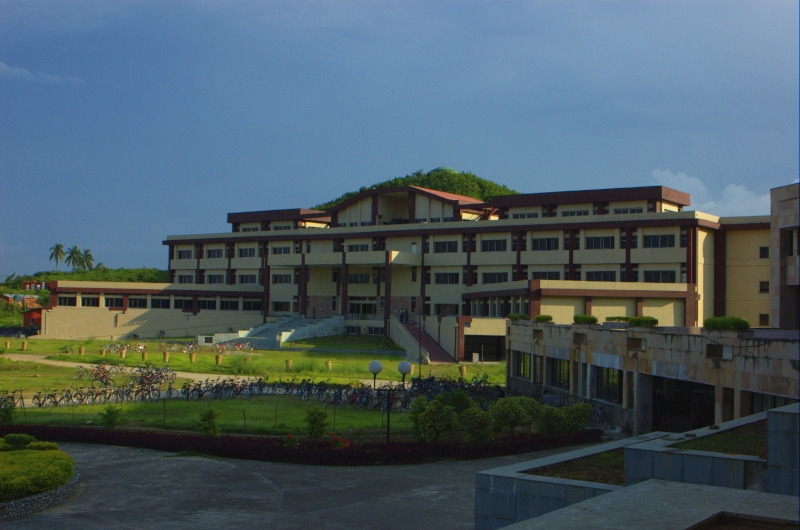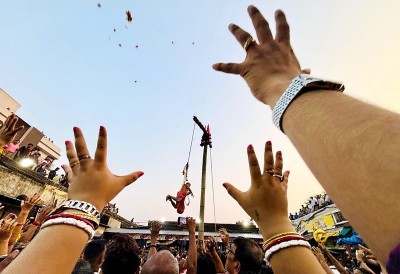 IITGuwahati
IITGuwahati
IIT Guwahati organises a session for its students pursuing MS (Research) in e-mobility programme with NITI Aayog CEO
Guwahati/IBNS: Indian Institute of Technology Guwahati organized an interactive session for the students of the first batch of MS (Research) in e-mobility programme on Sept 19.
The session was attended by Amitabh Kant, CEO, NITI Aayog, Anil Srivastava, Mission Director, NITI Aayog; Prof. T. G. Sitharam, Director, IIT Guwahati, faculty and students of MS (Research) in e-mobility of the Institute.
Speaking during the session, Prof. T. G. Sitharam, Director, IIT Guwahati, said, “The faculty has put together a multi-disciplinary programme which much before the National Education Policy 2020 was announced and also brought in industry partnership.
“From this year, we have introduced a policy such that every academic department should have at least 3 successful industry advisors who are successful in research and development in industry so that the curriculum can be inclusive of industry relevant problems over a period of time. We can increase the internship and externship. Additionally, we have also started with the idea of appointing Professors of Practice (PoPs) at the institute, so that having faculty from the industry who can provide expertise in industrial oriented problems is also inculcated as part of our curriculum. If we look at the government’s policy, India wants to achieve 30 per cent of e-mobility by 2030 for which major initiatives which have been initiated,” Prof. T. G. Sitharam said.
As a part of the curriculum, the Institute offers to conduct sessions and seminars delivered by industry experts. The aim behind these sessions is to make the students aware of the state-of-the-art in the EV technology and foster industrial problem-solving skill in them.
Addressing the students during the event, Amitabh Kant, CEO, NITI Aayog, said, “I would like to first congratulate the Director, faculty and students for starting such a unique course at IIT Guwahati.
This is a path-breaking initiative because India is in the middle of a mist of technological disruption and revolution.
This disruption will lead to a huge and massive shift from combustion vehicles to electric vehicles and we are heading towards a shared and connected zero-emission world. The government has taken several measures to push for electric motilities - it has introduced FAME and FAME 2 scheme, it has brought down the rate of taxes on electric vehicles at 5 % as compared to 28 % for other vehicles & 43 % for hybrid vehicles. We also give tax exemption, up to Rs. 1 lakh, to people who are buying electric vehicles.
As a consequence of all this, the focus on electrification will be huge and if India has to emerge as a leader in clean, connected and shared mobility there are two important things to keep in mind:
One is that India is a major user of 2 and 3 wheelers and 80 per cent of people travel in these vehicles and secondly battery will be an important component. Battery manufacturing and storage will be a key component and storage will have to be linked to renewable energy integration with the grid,” Amitabh Kant said.
He further said that – “During a mobility conference, the Prime Minister had stressed on the 7Cs: Common, Connected, Convenient, Congestion free, Charged, Clean and Cutting-edge. And the course should focus on how India can achieve these objectives.”
While addressing the questions, Anil Srivastava, Mission Director, NITI Aayog, said that – “We are looking forward to making more energy-efficient and less costing batteries. The e-vehicles are not required to give much tax. India is a great user of two and three-wheelers and e-vehicles will make a great opportunity in it.”
He further said that – “In the case of batteries we also have to see the market interest that what materials will be good to undertake the making of the batteries. We have to think practically what sources can be undertaken for the success of e-vehicles.”
While highlighting the unique features of the curriculum, Prof. Praveen Kumar, Coordinator of the MS(R) programme said – “We have given the emphasis on project work, and the projects will be executed in collaborations with industry partners. Moreover, industry expert lectures, from India, European Union (EU), and Japan, on topics related to e-mobility such as vehicle design philosophy, light-weighting, new battery chemistries, are planned. Furthermore, Professors of Practice (PoPs) will deliver lectures on niche topics like AUTOSAR, advanced control techniques, vehicle design, and we will develop a centre of advanced research in e-mobility at the Institute.”
The adoption of EVs has opened new opportunities. To prepare and train the next generation in EV technology and to extract maximum out of this unique opportunity, IIT Guwahati launched this unique programme. It is being jointly offered by the Departments of Electronics and Electrical Engineering and Mechanical Engineering and the classes began in September 2020.
The syllabus cover topics such as E-mobility, Electric and Hybrid Vehicles; Modelling, Dynamics and Control of EVs; and, Energy Storage and Conversion. The Institute is offering a total of 20 seats for the programme. 10 seats are for the students who have completed their B.Tech. in Electrical Engineering, Electrical and Electronics Engineering, Mechanical Engineering and Production Engineering.
The other 10 seats are for the industry-sponsored candidates. The programme also covers topics such as smart mobility, EV drivetrain design and control, EV testing standards and protocols, charging infrastructure and V2G, among other topics
Support Our Journalism
We cannot do without you.. your contribution supports unbiased journalism
IBNS is not driven by any ism- not wokeism, not racism, not skewed secularism, not hyper right-wing or left liberal ideals, nor by any hardline religious beliefs or hyper nationalism. We want to serve you good old objective news, as they are. We do not judge or preach. We let people decide for themselves. We only try to present factual and well-sourced news.







